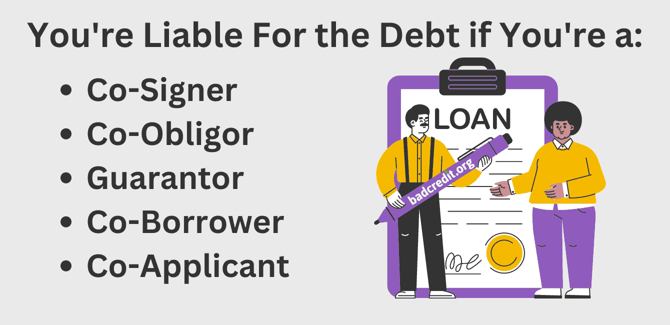
Despite all the optimism and joy that goes with tying the knot, it’s an unfortunate reality that a considerable percentage of marriages fail. And while the divorce rate seems to be different depending on whom you ask, according to the American Psychological Association, 40-50% of first marriages will end in divorce, with the figure reaching 60-67% for second marriages.
And while your children and finances are certainly among your priorities when you’re going through the divorce process, you should also consider how you can protect your credit reports and scores during and after a divorce.
How Marriage and Credit Intersect
When you get married, or even before, you may have co-mingled your credit obligations with your soon-to-be spouse. This happened when you applied for joint credit cards or loans or co-signed for an apartment or some other benefit.
Pretty much anytime you sign your name to an application or a promissory note obligating you to pay for something that is primarily in your spouse’s name, you have pledged your credit.
If you’ve ever heard the terms co-signer, co-obligor, joint credit, or guarantor, they all mean more than one person is liable for payment on something. That “something” can be a credit card, a loan, an apartment, or something else.

It’s not uncommon for people to believe they must co-sign for everything just because they’re married. But there is no obligation for anyone to ever co-sign for anyone else. It’s a voluntary matter of choice or, in limited situations, a matter of income.
When you co-sign for credit, your lender will consider both your credit reports and scores and the primary applicant’s credit reports and scores. The lender will also take into consideration both of your incomes.
That’s really the only upside to joint credit applications, two incomes. That means you can qualify for a larger amount of credit because of the joint capacity across both applicants.
How Divorce and Credit Intersect
When a couple gets divorced, they eventually agree to a settlement on financial terms. This can be as complex or as simple as the divorcing spouses are creative.
But one thing that often gets overlooked is how creditors view divorce settlements. Long story short, they don’t care about them. Your divorce settlement doesn’t supersede the terms of your credit card agreement or promissory note.
If you and your ex-spouse have joint loans or credit cards, you’re both still liable for payment even if you have each agreed to be responsible for different accounts as part of your divorce. That means if you or your ex-spouse stops making payments on joint loans or credit cards, the late payments are still going to end up on both of your credit reports. And any escalated collection attempts, including lawsuits, will target both liable parties.
Roughtly 40% to 50% of first marriages and 60% to 67% of second marriages end in divorce.
— American Psychological Association
Your creditors will not release you from your co-obligor obligations just because you’re divorced. And they will not remove late payments from your credit reports just because the other spouse agreed to make the payments on time but didn’t.
You must take steps to deal with joint obligations as part of the divorce process, or your credit may be destroyed.
Strategies to Protect Your Credit
You can do several things to protect your credit in a relationship. Some of these things occur prior to a marriage, and some occur prior to a divorce.
Don’t Co-Mingle Credit
There’s only one good reason to jointly apply for credit or “sign” for someone else: You may need two incomes to qualify for a mortgage loan. Homes are expensive, and APRs are above 7% as of the posting of this article.
Those two factors can mean you end up with higher monthly mortgage payments.
Other than needing two incomes to qualify for a mortgage, no other form of credit requires two incomes. You certainly don’t need two incomes to qualify for a credit card. And, if you need two incomes to qualify for a car loan, I would argue that you’re buying too expensive of a car.
Maintain Credit Independence: It helps ensure you won’t need to separate debt obligations amid a divorce.
The upside of maintaining credit independence during a marriage is that you don’t have to worry about extricating yourself from a loan or credit card debt during divorce.
Close Joint Credit Cards Before You File
This is the one-and-only scenario when you’ll hear me advise you to close credit card accounts. If you know you’re going to file for a divorce, it’s in your best interest to close all joint credit card accounts.
This will prevent a vindictive soon-to-be ex-spouse from running up the balances on your credit card accounts. It doesn’t entirely solve the joint credit problem, but it certainly prevents it from getting worse.
Be Proactive with Open Accounts: Closing them before filing can help protect both parties involved.
We know closing existing credit cards can lead to lower credit scores because of the potential spike in your revolving utilization percentage. So, opening a few cards in your name before you close the joint cards is a good idea. That way, you still have the benefit of credit cards when you close your existing accounts.
Sell or Buy Your Assets
If you have a home or a car securing a joint loan, then one option would be to either buy the home or car from your ex-spouse or sell the home or car to your ex-spouse. This can be as simple as refinancing the loan into one spouse’s name rather than two.
Of course, if neither of you has the income to buy the car or home on your own, then you may have to sell it to someone else. Here’s where you must ignore that little voice in your head that keeps reminding you about the sentimental value of the house or car — get rid of it and move on.
Get Out of Joint Obligations: Sell or refinance assets to remove joint debt liabilities.
Once the home or car has been sold, the loan is formally exhausted, meaning it has been paid off, and the balance is now zero. That effectively eliminates the joint obligation, and now the proceeds from the sale can be divided among the spouses as they see fit.
It’s a whole lot easier to divide money than it is to divide a house.
How Can I Tell if I Have Joint Obligations?
If you don’t know whether you have any joint obligations, your credit reports can help solve the mystery. There is a field on a credit report called the “ECOA” field, which stands for Equal Credit Opportunity Act. Lenders use the ECOA field to define your relationship with a loan or credit card account.
When you check your credit report at www.AnnualCreditReport.com, you’ll see how the creditor reports your relationship with the account in the ECOA field. If you see “Individual,” it’s just your account. If you see “joint,” “co-signer,” “co-maker,” or “guarantor,” that means you’re liable for an account along with someone else.
These are the accounts you’ll need to keep in mind if you ever file for a divorce and have to deal with joint obligations.



